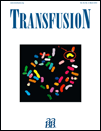Acute exacerbation of subclinical pulmonary fibrosis after red blood cell transfusion: a case report
Supported by NIH HL086884, Vascular Medicine Institute Hemostasis and Vascular Biology Grant from the Institute for Transfusion Medicine (JSL).
Abstract
BACKGROUND: Red blood cell (RBC) transfusion is associated with lung injury in susceptible hosts, although many cases do not meet criteria for transfusion-related acute lung injury. Patients with underlying pulmonary fibrosis can exhibit precipitous deteriorations in respiratory status of unknown etiology defined as acute exacerbations due to superimposed lung injury syndrome. It is unclear whether RBC transfusion is associated with acute exacerbation of underlying pulmonary fibrosis.
CASE REPORT: We describe a patient who underwent an uneventful elective left total hip replacement but developed anemia postoperatively. Twenty-four hours after transfusion of her fifth nonleukoreduced AS-5 RBC unit, she developed new bilateral airspace infiltrates associated with progressive hypoxemia. These RBC units were 35 to 38 days old. Despite supportive care and diuresis, the patient remained profoundly hypoxemic with infiltrates that progressed to fibrosis.
RESULTS: The patient had mild subclinical lower-lobe predominant interstitial pulmonary fibrosis but developed diffuse bilateral ground glass opacities with areas of consolidation 24 hours after receiving her last RBC unit. Transbronchial biopsy of the right lower lobe showed active organizing pneumonia and underlying interstitial fibrosis, supporting the clinical diagnosis of acute exacerbation of pulmonary fibrosis. The bronchoalveolar lavage showed progressive bloody effluent, consistent with diffuse alveolar hemorrhage, a marker of lung injury. There was no evidence of viral inclusions, fungal elements, pneumocystis, or bacterial organisms.
CONCLUSION: Transfusion of multiple units of aged RBCs was temporally associated with an acute exacerbation and rapid progression of underlying subclinical pulmonary fibrosis.




